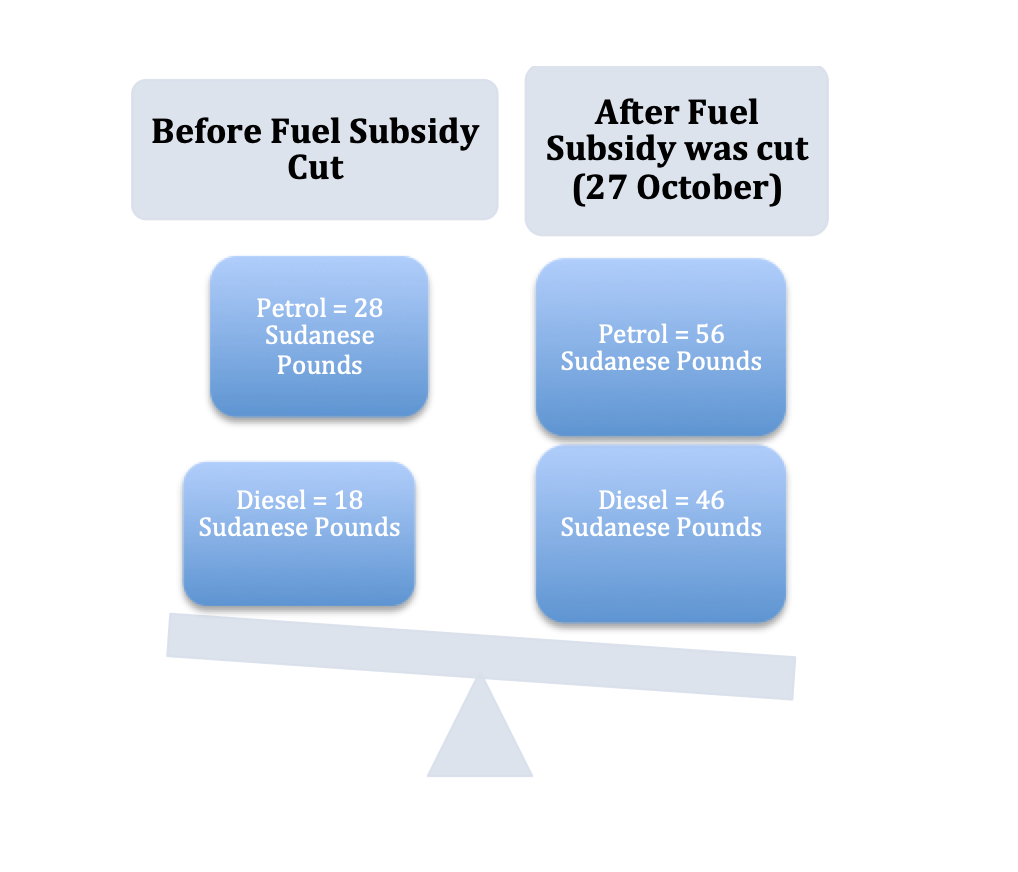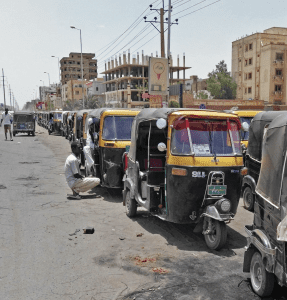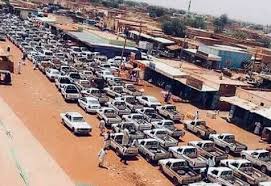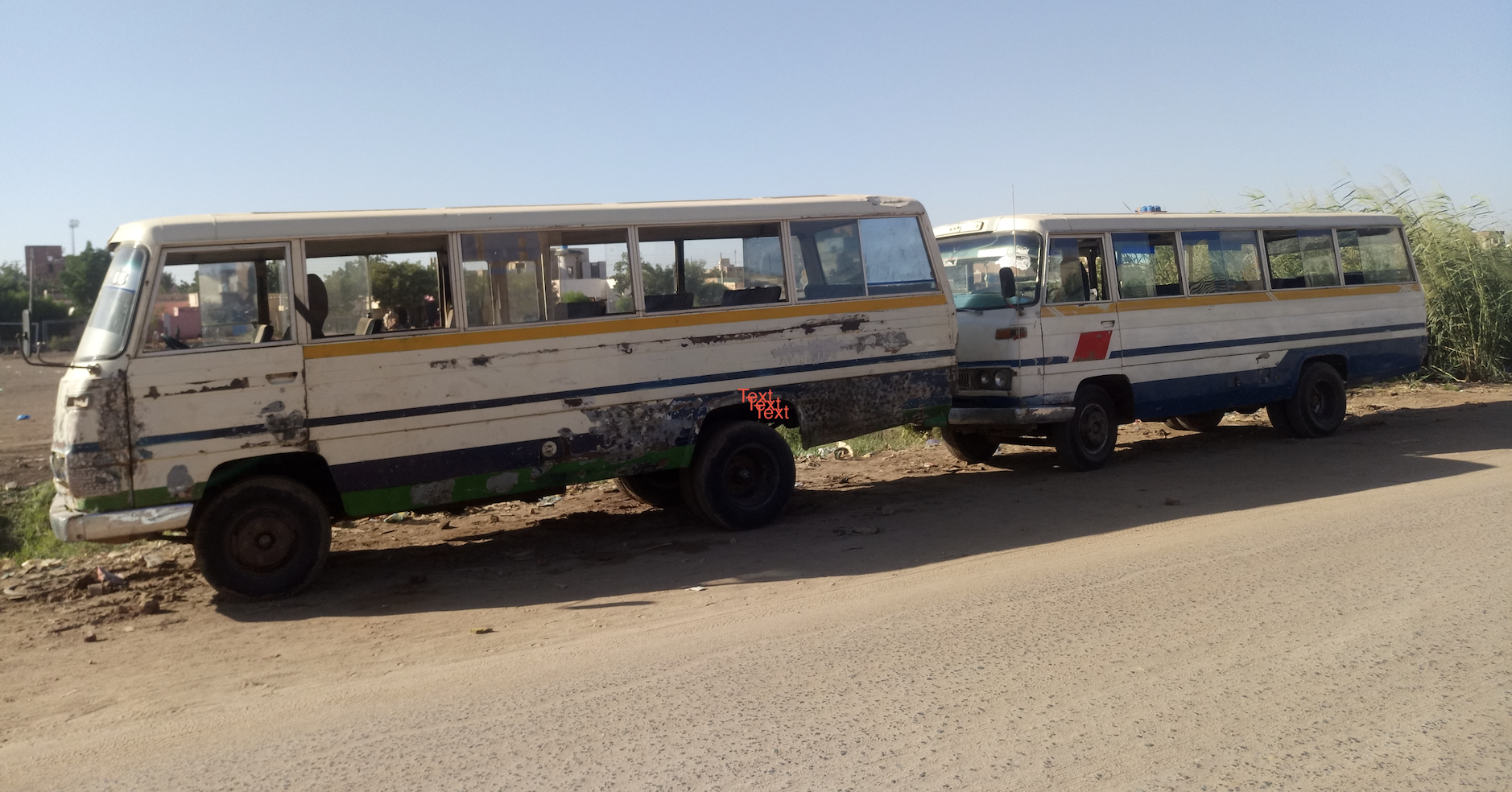Sudan’s Government gambles over fuel cuts and people pay the price
14 November 2020
“The cost of living is gradually becoming more unbearable; all prices had doubled now for everything with the pound losing its value. And now the cost of fuel is increasing significantly, how can I send my children to school this year when the transportation fees increased from 10,000 Sudanese Pounds (US $40) for the school year to 10,000 a month for the single student, and I have three children in school!” Mohamed Ibrahim, a resident in Khartoum North told Ayin.
With average incomes in Khartoum at around US$ 100 per month, school transport costs are prohibitively expensive for Ibrahim, despite the fact he works two separate jobs.
More challenges fell onto civilian’s lap after the transitional government partially cut fuel subsidies on 27 October as part of their attempts to remedy the dire economic situation in the country where inflation recently surpassed 200 percent.
 By the new orders, some petrol stations are now selling locally produced fuel at 56 Sudanese Pounds per litre for petrol and 46 pounds per litre for diesel, roughly double the previous prices of 28 and 18 respectively. Other stations are selling imported fuel by the international market rate; which is 120 per litre for petrol and 106 per litre for diesel.
By the new orders, some petrol stations are now selling locally produced fuel at 56 Sudanese Pounds per litre for petrol and 46 pounds per litre for diesel, roughly double the previous prices of 28 and 18 respectively. Other stations are selling imported fuel by the international market rate; which is 120 per litre for petrol and 106 per litre for diesel.
IMF’s Prescription
 “Lifting fuel subsidies and liberalizing the currency exchange rate is part of the government attempts to meet the technical conditions of the International Monetary Fund – by having a good track record and showing commitment to economic reform – to enable reviewing Sudan’s debt and seeking possible future support,” says economist Khalid al Tijani. “The government took this move relying on financial support they expected out of the donors conferences.”
“Lifting fuel subsidies and liberalizing the currency exchange rate is part of the government attempts to meet the technical conditions of the International Monetary Fund – by having a good track record and showing commitment to economic reform – to enable reviewing Sudan’s debt and seeking possible future support,” says economist Khalid al Tijani. “The government took this move relying on financial support they expected out of the donors conferences.”
Al Tijani told Ayin that talks about lifting subsidies go back to the end of 2019 as the government prepared the 2020 budget, but the implementation was delayed partially due to internal political disagreements and the outbreak of the Covid-19 pandemic. “The government suspended the budget for the first quarter of 2020 as a temporary solution and called for an economic conference around March. They also wanted to see how the conferences of Friends of Sudan and Donors panned out.”
The Sudan Partnership Conference held in Berlin last June pledged US$1.8 billion to improve macro-economic stabilization and develop the Sudan Family Support Program. While welcomed, the pledge was far less than the government had hoped for – estimating that US$ 5.4 billion dollars were needed to revive Sudan’s economy.
Public Refusal
Transportation costs are now prohibitively expensive for Khartoum residents with partial subsidy lifting while the fuel shortages continue as many public transport vehicles are no longer available on regular bases. Transportation prices witnessed an increase of 100-200% that varies at different times of the day, without an official rate. The decision has been met with a barrage of criticism both in public spheres and on social media. “Lifted fuel subsidies – this is in the name of raising the blood pressure and diabetes for the defeated Sudanese citizen,” writes Emad Hamid via Twitter.
The revolutionary umbrella group, Forces of Freedom and Change (FFC), issued a statement on 31 October condemning the abrupt lifting of fuel subsidies and called for the removal of those who implemented the policy.
As the government seemed to have no supporters in their action, the Sudanese Congress Party was reported to stand by the move. Party representative Nuraldeedn Babiker told Ayin that they in fact do support lifting the subsidy, but not the way it was done by the government, calling it premature and problematic.
“First – as a short-term plan – the government should have gained control over public funds, reformed investment laws among other steps, in addition, to identify all the people impacted by lifting subsidies; then restructure subsidies for them not to be affected. Then, in the long-term subsidies should be lifted and the funds can go to basic services for the citizens”, Babiker said.

Huge Burden
The lack of clarity over the level of donor support, internal rifts within the government such as the resignation of the former finance minister – not to mention disputes over economic reforms with the FFC — has put pressure on the government to act, says al-Tijani. Even the IMF has criticized the plan, he added. Lifting subsidies, even partially, and shifting to a liberalized currency exchange rate without the necessary cash reserves available in the central bank will lead to further disastrous inflation rates, al-Tijani warns since the state will be forced to print more local currency.
Questions remain how the government can achieve economic reform without having tangible control over the market, al-Tijani says. The security and military sectors, the Rapid Support Forces militia, in particular, own corporations operating in the private market sector with little oversight over tax payments and other fees, he added. “The head of the Rapid Support Forces also heads the [government] Economic Committee – besides controlling the gold market – is an example of this issue.”
Al-Mughtaribeen (or “Expatriate University) University Economics professor Mohamed al-Nair told Ayin that the government took a leap to the unknown by abruptly, albeit partially, lifting the fuel subsidies. “This is a step in the wrong direction as the government needed to achieve economic stability first –and they had a year to work that out– then considering the citizens’ situation and how they will be impacted”

“I can’t go to my work most of the days as the transportation isn’t available, and many times I have to take taxis – which is a huge financial burden that my salary doesn’t cover – I had to apply for my annual break until things get better,” says Amal Abdullah, a commuter who lives in Omdurman and works in Khartoum.
The Way Out
“The government put all their eggs in the foreign aid basket and they made up an unrealistic budget based on the support that is not in hand. Therefore expenses exceeded income, the central bank kept printing more currency and the inflation increased,” says al-Tijani, adding that they need to fix the basic economic indicators in order to move forward.
“Sudan needs to focus on productivity and support to farmers, [as well as] enhance the taxing system,” he adds. According to the World Bank, Sudan has one of the lowest tax revenue bases in Africa. Sudan accrues around 6% from taxes while the average on the African continent is more than double at 15 percent, according to al-Tijani. “Rich people are not taxed — most of them have the power to avoid taxes while less privileged people suffer from taxation.”
Al-Nair also thinks that the government neglected production and placed too many hopes on financial aid. The university professor does not think they will receive this elusive aid. “The government is unlikely to receive financial support, and if they continued down this road it will not emerge from this darkness anytime soon.”


